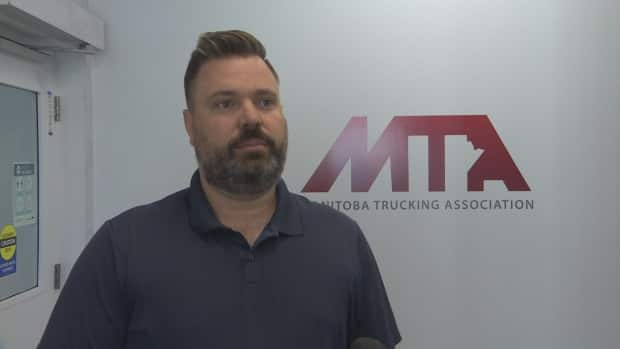Trucking industry, students pained by long wait for licences despite increased testing in Manitoba

Hopeful drivers of semi-trailer trucks are waiting longer than usual to do a road test for Class 1 licences so they can start working in an industry struggling with a shortage of drivers.
Manitoba Public Insurance started offering up to 500 monthly road test appointments since June last year; almost double a historical average of about 250-300 per month, according to Kristy Rydz, manager of communications with MPI.
Rydz said in an email that MPI also started testing at its Physical Damage Centre location on Plessis Road "to make more appointments available sooner."
Students, driving school instructors and industry professionals say their wait times are still concerning.
Amanpreet Singh Dhaliwal, who took the test in June but failed, said his days have been dedicated to calling MPI as much as possible to secure an early restest date.
While appointments can be booked for months in the future, Dhaliwal said he needs to find an earlier date because he left his previous job to train to become a truck driver, and now can't work because he hasn't gotten his Class 1 licence. He said he calls MPI more than 100 times in a day hoping to catch appointments that become available due to cancellations.
"Let's say if I'm just 15 minutes away from my cell phone and the appointments come and people call and take the appointment, that's my fault," Dhaliwal said.
"It should not be like that, that we have to wait for that long time," he said.
Dhaliwal said sometimes an appointment for a test will be cancelled if the weather is too bad, but to reschedule, the student must rejoin a line of people who are waiting months. He said he knows of students who go as far as Dauphin from Winnipeg to do the test.
"If the government really wants to have more drivers coming into the industry, they have to increase the availability of the Class 1 road test," Dhaliwal said.
The most recent Manitoba Labour Market Outlook designates transport truck drivers as a "high demand occupation" with a projected 5,000 job openings between 2021 to 2025.
Aaron Dolyniuk, executive director of the Manitoba Trucking Association, said the delay in drivers being tested is certainly contributing to the shortage, but highlighted that there are other challenges.
"The average age of truck drivers in Canada, according to, I believe, a 2018 report, was 55 years old. So there's a lot of truck drivers that are kind of getting towards the end of their careers, retiring out and so forth," Dolyniuk said.
Restesting driving backlog
Dolyniuk said the wait time is something that the MTA is aware of and concerned about it.
"I think MPI is doing more testing than they've ever done before, but they're being overloaded by the amount of retests that individuals are having to take. I'm told somewhere around the average is three tests for an individual to pass a Class 1 road test," he said.
MPI confirmed that the current average pass rate for Class 1 road tests is between 30 and 35 per cent.

Dolyniuk said the delays may be symptomatic of larger problems the industry is facing, such as the need for pre-screening people signing up to be truckers, as well as taking another look at training.
"The question I would ask is how are people passing MELT [Mandatory entry-level training], but not passing the road test. If they've gone through and they truly have passed those parts of the curriculum, why are they failing the road tests?" he said.
Five instructors from MPI's list of approved training providers told CBC that the long wait times for tests was a significant challenge for students, but said they would not speak openly about the issue as they did not want their students to be negatively impacted in any way.


